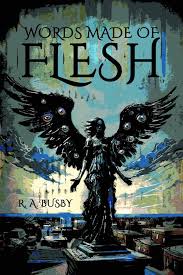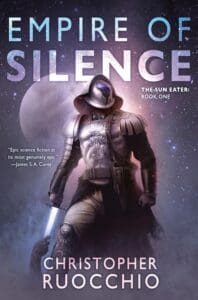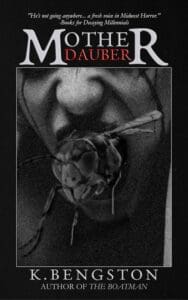
Synopsis:
New Bedford, 1899
Harrison Quire has a problem. Haunted by memories of his lover, he’s only lingered on the periphery of a life. When he visits the Whisperers’ Club to hear a few horror stories, he never expects he’ll become one.
Late one winter night, Harrison hears old George Burgess tell his tale of an unusual book. The book, Burgess explains, is made of flesh. It is alive. And so hungry. Harrison is soon enthralled by the story, but will he be consumed by it?
Review:
“Words Made Of Flesh,” by R.A Busby is a queer, Victorian horror novella, that tenderly whispers it’s eerie secrets to readers. A tantalising mix of a meta narrative, with Busby’s own brand of cosmic horror… yeahhhhh, suffice to say it’s deeply unsettling. Having read and enjoyed both “Bits,” and “Corporate Body,” by this author, I can confirm that she is consistently poignant and compulsively readable… what’s more, with every release Busby just gets better. Cemetery Gates Media, who are absolutely killing it at the moment, release this bad boy on July 11th. This is a novella you will want to devour.
We follow Harrison Quire, who attends meetings at “The Whisperer’s Club,” which take place nestled within the expanse of Matthews’ extensive library. Amidst the rather intoxicating smell of aged paper, sinister stories are exchanged amongst members, and this time, George Burgess holds the floor. George speaks of a book, but rather peculiarly, it’s not leather or cloth bound. Burgess’ book is made out of flesh, and it attaches itself to the life of its owner. From George’s progenitor to his own mortal coil, the tome certainly has a sinister legacy, and one can’t help but wonder whose fate will become entwined with its eldritch pages next.
The real source of horror comes from Burgess, whose recounting of his entanglement with the pocket-book to Quire forms the crux of our narrative. Harrison then, serving as a conduit, recounts every detail with chilling clarity to us, the reader. We’re placed in an unsettlingly intimate position considering the first person narrative and consistent direct address. We are his confidantes, confessors, even disciples. These devices are often wielded by authors to make us feel complicit… guilty even, and whilst we do encounter this to a degree, here it’s deliberately used to escalate our terror, and align our own fates with that of George and potentially Harrison. Perhaps this is done to evoke a sense of shared vulnerability. There’s a profound and personal dread from beginning to end, in short: prepare to be afraid, very afraid.
I think this story is one that is very open to interpretation. Ostensibly, it’s a novella about a book made of human skin, but really it’s so much more. One theme that I found to be quite prominent was the weight of legacy, and the often malevolent influence of lineage. Considering that the book first claimed Burgess’ father, before digging its talons into George later, the idea that burdens are inherited and generational trauma is persistent, is strongly illustrated.
Furthermore, Harrison and George’s homosexuality, ensnared within the societal norms of Victorian society imbues the narrative with such depth. Jekyll and Hyde walked so that “Words Made Of Flesh,” could run. Of course, in 1899, homosexuality was not just stigmatised, but criminalised, something which profoundly impacts the lives of the two characters. Quire’s regular attendance at the clandestine “Whisperer’s Club,” could be viewed as a metaphor for the secretive existence necessitated by his sexuality. The club’s covert nature and the horror stories it hosts serve as a parallel to the hidden lives and unspoken fears of homosexual men of that era. Quire stays to listen to Burgess’ story long after the others disperse, this could be a reference to the strong connections formed by minorities in repressive societal contexts. As for Burgess, his traumatic past, and the burden he carries in the form of the pocket-book could serve as an allegory for the internal and external conflicts he faces in regard to his sexuality. The flesh bound novel may symbolise the societal condemnation and personal anguish associated with being gay in the 19th Century. Perhaps this is reaching, but I’ve got my analytical hat on, so it seems as if even the first person narrative style creates a space where hidden truths are revealed, perhaps representative of the coded ways in which the LGBTQ+ community were forced to communicate for their own safety. In essence, themes of secrecy and repression, as well as the search for connection amidst societal condemnation are all thoroughly explored by Busby in this manner, which is impressive within such a short piece. (my brain hurts now).
In conclusion Busby’s upcoming novella promises a captivating read that horror enthusiasts are sure to devour. We close the final page (rather reluctantly) with a deeper understanding of both horror and humanity. Ultimately it reminds us that many fears are eternal, and some legacies are bound in flesh.








Leave a Reply